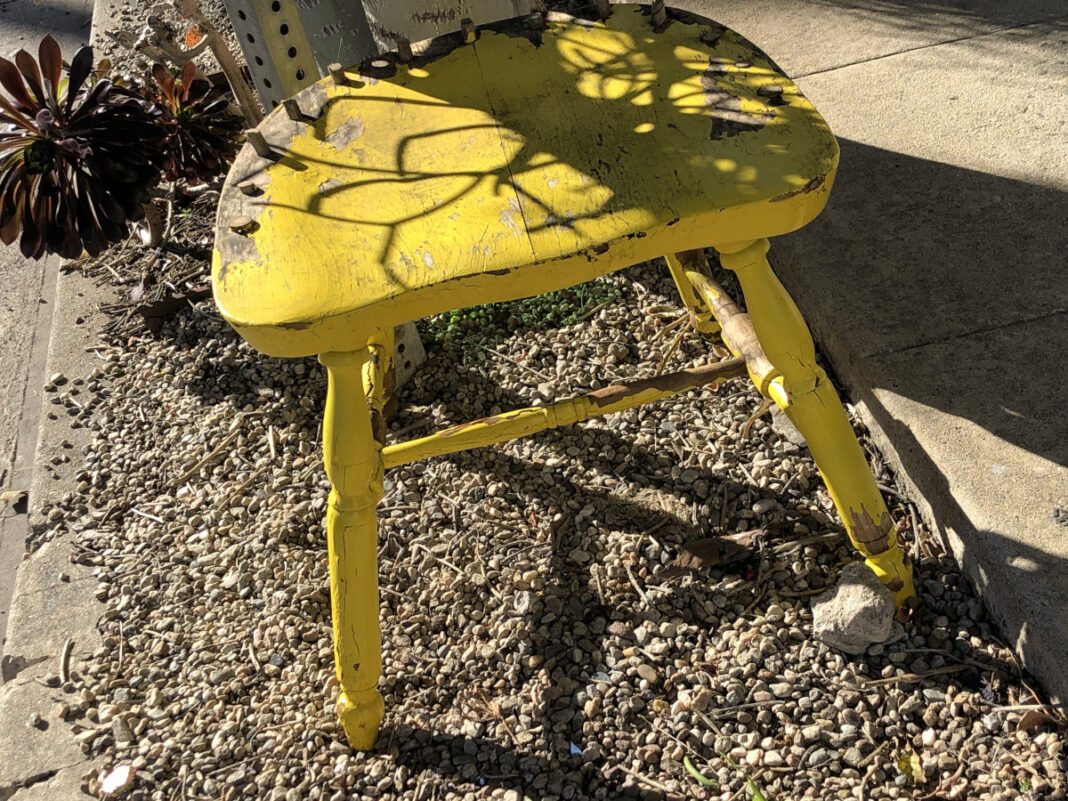UNITED STATES—Banana yellow seat in the sun…“I would like to be a write-in for mayor,” Graydon told a confidante.
“When we prune tree branches, it behooves us to start at a lower branch,” said Pasha, eating almond pralines in bed. She was from Russia and whip-smart.
“You think I should be dog catcher?”
“Start out as an aide.”
“To a city councilman?”
“Too small,” said Pasha. “Sidle up to a County Supervisor. They cover a much wider area, and you will learn so much. All politics is local, like they say. Where was it that you taught night school all those stinking years?”
Graydon was distraught. He had NEEEEEEVER told Pasha about that work; he never told anyone about it, it had been so humiliating and emotionally taxing. Pasha, who had been one of Graydon’s students downtown, continued:
“Yes, I know it’s something you’re not particularly proud of it, but whether you know it or not, your political career started there. You appeared nightly before an audience. You gave speeches before full auditoriums, and from what I hear you were quite good at it.”
That was the moment, that was the place. One thing and another. Graydon left Hollywood and moved out to a stucco-balcony-apartment in Sun Valley, you know the kind. Ingratiated himself in the good graces of the District 3 Supervisor, in a district that boasts a population greater than that of 14 states and Washington D.C. District three, it had country, coastline, desert, pecos, mesas, the Vasquez Rocks, for godsake! Pristine suburbs and dumpy suburbs, the judicial and documentary hub of the whole of Los Angeles in Van Nuys.
The Valley was a country.
“We went to all the Rotary Clubs, when I had other commitments in D.C. Sacramento,” recalled supervisor Lew. “And he was really good at fixing things. I know he’d drive around the Valley, sometimes after midnight, talking to mothers, issues with kids, school, fathers fearing for their kids future, and he’d hobnob with the Hollywood bigwigs and they all had something that needed fixing. He was very good for that. Till then he had been a writer, an actor and self-hating teacher and something happened during this time, it’s when he truly became Graydon and was enthroned with the values of his future constituents, their concerns, hopes and dreams.”
Ever saturnine, he learned to put this behind, all behind, when the microphone was on. The travels began. There was a fact-finding mission about homelessness and the supervisor for whom he worked, Darby, sent him on a fact-finding mission to Washington D.C. which local obligations prevented her from attending. One of the leaders of the political party that was out of power at the time was impressed by Miller’s knowledge, accrued from many years of dealing with the outcasts and rejects (i.e. the people he talked to, or sometimes listened to as they talked to themselves), in the doughnut shops where he passed his sullen apprenticeship as a writer.
And particularly carried out for a novel, he was going –in point of fact was still writing in insomniac hours— after politics, the least expected rival in Graydon’s Miller’s haphazard rise foretold by his response to his mother when she asked him, then a toothy boy in the eighth grade:
“What do you want to be when you grow up?”
“I want to be famous,” he replied without a moment’s reflection. To help raise a child on an ample scale, on a shoestring, was indeed an important thing, and when the town would hug the horizon at night, and old cumbias would play, there was a hopeful impasse in the hours after sunset and before dawn, that they would not be forsaken by the moon and the sun, and the crickets chirped in the heavy humid air.
Because of sending out all those messages, there was an event which took him to Washington and Miller met with a high-ranking official from the party then out of power, suitably impressed, and he was appointed as envoy to Cascadia. The inchoate Republic of Cascadia stretched from 42° to 60° north latitude. Its western border consists of the Pacific coastline and a portion of the American state of Alaska. On the east, it borders the American states of Idaho and Montana and the Canadian province of Alberta. It was right on the cusp of being a free and independent state, an island of rugged natural beauty, vast arid lands ripe for mineral exploration and new housing tracts.
He and Pasha were onto something, it was a mutual seduction, she had her own way, with a sociological prism that excited Graydon’s critical dreaming and ambitions to achieve a moneyless society. He would always cherish the day she introduced the concept of cognitive dissonance, a kind of raft to climb aboard in times of rising tide of an overheated world. On the other hand, he had his own surefire methods of seduction, reminiscent of the KGB. In his brain when somebody fascinated him, he stored a great deal of information about their background, likes dislikes, accomplishments and passions, and it would be easy for him to locate a number and dial:
“Hi, it’s been a long time. No use telling you my name, but it was a drunken night two hot summers ago, and you and a girlfriend of yours were in town from Lancaster.”
But of course she remembered. . .
Grady is the Wizard of Fiction…






